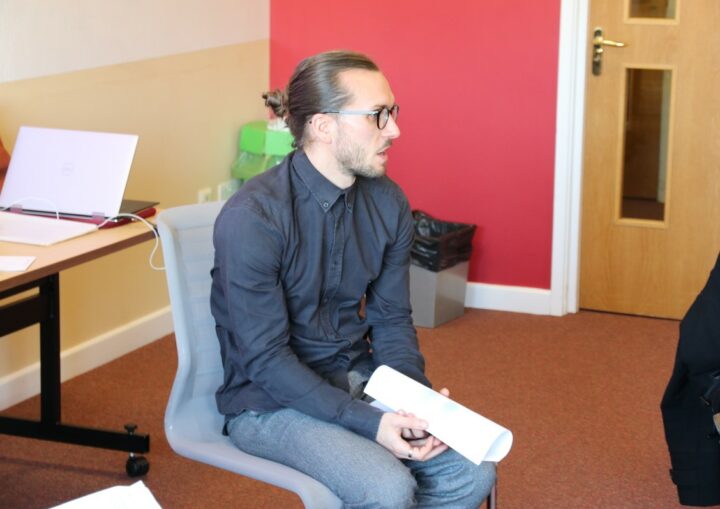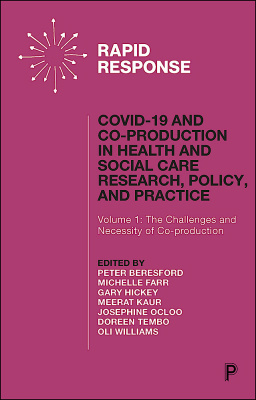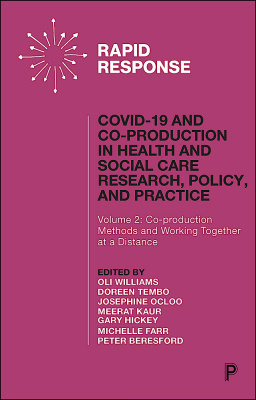COVID-19 and Co-production in Health and Social Care Research, Policy, and Practice


I know I am not alone in struggling to define co-production in health research. The term is used increasingly frequently, but not always in the same way.
At a recent THIS Institute workshop, invited speakers Oli Williams (THIS Institute Fellow) and Sarah Rae (expert by experience and user-led researcher) shared their frustrations at what they saw as an increasing tendency to use co-production as a catch-all term for any involvement or collaboration between researchers and non-researchers. They argued for limiting use of the term co-production in the context of health research to describing collaborations between researchers, healthcare professionals, and those traditionally marginalised (eg, patients, service users, carers, public contributors, community groups) in which issues of power are explicitly addressed and equitable partnerships are formed from the outset. With the purpose of co-production to bring people together to identify issues and commit to doing something about them. They also acknowledged that putting co-production into practice in this way throws up a number of challenges for all those involved.
Enter the pandemic. Over the last year, social inequalities have meant that COVID-19 has had a disproportionate impact on some communities over others. Questions around who gets to be involved, define problems, and frame the objectives for health research and policy now take on an added urgency.
the books address a range of issues relating to research inclusion and exclusion
It is against the backdrop of the pandemic that Oli, as part of his THIS Institute fellowship, embarked on co-editing COVID-19 and Co-production in Health and Social Care Research, Policy, and Practice, two volumes of work that explore co-production during the pandemic. Gathering an impressive team of co-editors and authors, the books address a range of issues relating to research inclusion and exclusion, including systemic barriers, inequitable access, hierarchies and tokenistic practice. Over 100 people have contributed to this collection. The editorial team prioritised bringing together a diverse range of contributors so that the book provided a platform for (i) people with perspectives that have been marginalised and excluded during the pandemic – specifically those with relevant lived experience and (ii) those who can offer practical advice about ways of redistributing power in decision-making processes in order to achieve more inclusive practice and effective outcomes; the editors reflect on this process at the end of volume 2.
 Volume 1 makes the case for putting co-production and participatory approaches at the centre of responses to the pandemic, illustrating how they can mitigate challenges of exclusion. For example, the chapter by Montenegro and Szabzon of the Brazilian Brigade of Sapopemba reports working with communities in extreme poverty. Capitalising on their strong relationships, they quickly mobilised to help meet the basic needs of the population and collect information that would direct future policies and education to inhibit the spread of COVID-19. This example vividly illustrates the extent to which relationship-building is a core part of any successful collaboration.
Volume 1 makes the case for putting co-production and participatory approaches at the centre of responses to the pandemic, illustrating how they can mitigate challenges of exclusion. For example, the chapter by Montenegro and Szabzon of the Brazilian Brigade of Sapopemba reports working with communities in extreme poverty. Capitalising on their strong relationships, they quickly mobilised to help meet the basic needs of the population and collect information that would direct future policies and education to inhibit the spread of COVID-19. This example vividly illustrates the extent to which relationship-building is a core part of any successful collaboration.
Challenges closer to home revealed that we are still far from a situation where involvement in research is routine. In the UK, early in the pandemic, only 20% of studies reviewed by ethics boards had an element of patient and public involvement (PPI), Hickey et al’s chapter reveals. Pre-pandemic that figure was 78%. This wake-up call led to concerted efforts by patient and public involvement professionals and lay contributors working with the Health Research Authority to reverse this.
 Volume 2 provides a rich collection of case studies. It is this volume that health researchers keen to understand how to do co-production will perhaps find particularly valuable. The many examples of co-production that working online has enabled make for informative and enjoyable reading. They include people with physical disabilities who were able to join meetings (sometimes for the first time) equally with able-bodied colleagues; and young people with autism co-creating information sessions for healthcare professionals on what it was like to live with autism. Niner and Portman’s chapter provides a palpable description of the feelings of empowerment for both these groups.
Volume 2 provides a rich collection of case studies. It is this volume that health researchers keen to understand how to do co-production will perhaps find particularly valuable. The many examples of co-production that working online has enabled make for informative and enjoyable reading. They include people with physical disabilities who were able to join meetings (sometimes for the first time) equally with able-bodied colleagues; and young people with autism co-creating information sessions for healthcare professionals on what it was like to live with autism. Niner and Portman’s chapter provides a palpable description of the feelings of empowerment for both these groups.
Each chapter in both volumes ends with a ‘what needs to be done’ section, with practical tips and advice as well as calls to action for health researchers, funders and policy makers.
addressing the power imbalance between professionals … and patient and public contributors
The lens through which the books examine co-production is firmly fixed on addressing the power imbalance between professionals in healthcare research and policy and patient and public contributors. The editors strongly argue that the pandemic presents an opportunity to address this, and that doing so will improve health and social care research now and in future. There is much that is attractive about a more co-produced approach to health research. Some readers will disagree with elements of the arguments in some of the chapters, and the strong assertion of some contributors to the collection that co-production can fix so many challenges. The contributors are clearly very passionate about this way of working but the editors acknowledge that wider and deeper work will be required to address the longstanding inequalities in society that the pandemic has amplified.
These new books from Policy Press provide a feast of ideas for anyone keen to employ co-production in healthcare research. The books are freely available to download via the links below with thanks to the Health Foundation, who provided funding to support open access fees.
COVID-19 and Co-production in Health and Social Care Research, Policy, and Practice
Volume 1: The Challenges and Necessity of Co-production
Volume 2: Co-production Methods and Working Together at a Distance